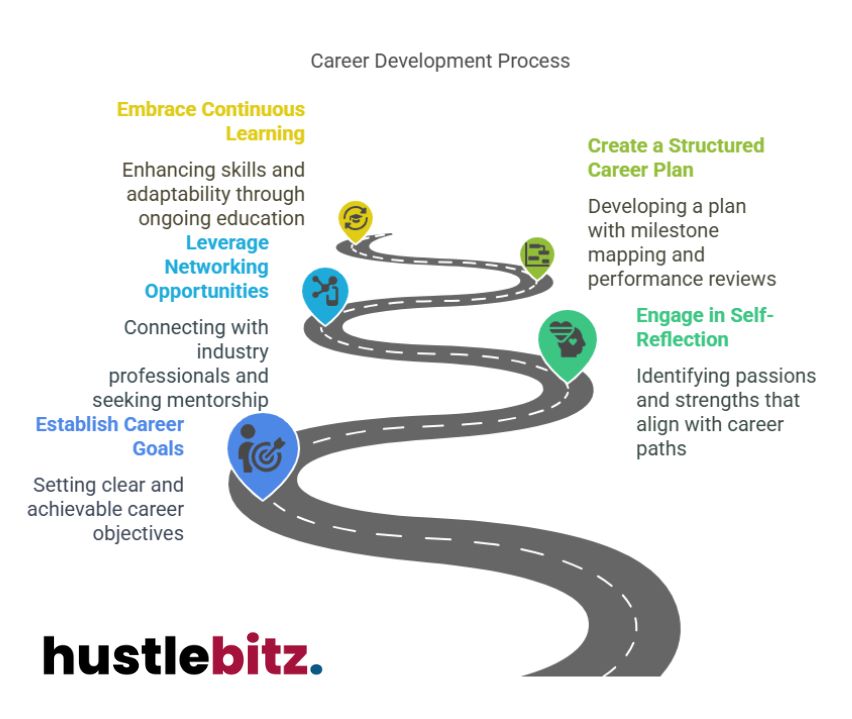Setting goals for career growth is essential for professionals aiming to enhance their skills and reach long-term objectives. Begin by identifying your passions and strengths through self-reflection, which allows you to align your career pursuits with your interests. Establish clear and measurable goals to guide your development and maintain motivation. Engage in networking to connect with mentors and like-minded professionals. Additionally, seek hands-on experience through internships and continuous learning opportunities to refine your skill set. A well-structured career plan will further support your journey, paving the way for sustainable growth and success in your professional life. More insights await ahead.
Key Takeaways
- Establish clear and achievable career goals to provide direction for professional development and growth.
- Engage in self-reflection to identify passions and strengths that align with potential career paths.
- Leverage networking opportunities to connect with industry professionals and seek mentorship for guidance.
- Create a structured career plan that includes milestone mapping and regular performance reviews to track progress.
- Embrace continuous learning through online courses and hands-on experiences to enhance skills and adaptability.

Career Growth Basics

Career growth encompasses the continuous process of enhancing skills, gaining experience, and advancing within one’s professional field to achieve long-term career objectives. Understanding the basics of career growth is essential for anyone looking to navigate their professional landscape effectively.
One key aspect of career growth is identifying diverse career paths that align with personal interests and skills. Researching industry trends can provide valuable insights into emerging opportunities, helping individuals make informed decisions. Additionally, effective networking strategies are crucial; building relationships within one’s field can lead to mentorship opportunities, which often offer guidance and insight from seasoned professionals.
Personal branding plays a significant role in career advancement. Crafting a strong personal brand allows individuals to distinguish themselves in a competitive job market, while resume building and mastering interview techniques are vital skills for securing desired positions. Engaging with professional associations can also enhance one’s visibility and credibility while providing access to resources and networking events.
It is important to consider work-life balance when pursuing career growth. Prioritizing personal well-being alongside professional ambitions ensures sustainable development and prevents burnout. Regular job market analysis can help individuals stay informed about shifts in demand for skills and roles, enabling proactive adjustments to their career strategies.
Why Goal Setting Matters
Setting clear and achievable goals is essential for guiding professional development and ensuring sustained progress in one’s career journey. Effective goal setting creates alignment between personal values and professional aspirations, fostering a sense of purpose. By defining measurable objectives, individuals can track their advancements and establish success metrics that reflect their achievements.
Moreover, goal setting serves as a powerful motivation source, encouraging individuals to strive for both short-term wins and a long-term vision. These incremental successes not only build confidence but also reinforce commitment to overarching career ambitions. To navigate the complexities of professional growth, individuals often benefit from accountability partners who provide support and encouragement, helping to maintain focus and drive.
Incorporating feedback loops into the goal-setting process allows individuals to assess their progress and make necessary adjustments. This adaptability strategy ensures that goals remain relevant and aligned with evolving career landscapes. Regularly revisiting and refining goals can lead to enhanced performance and greater satisfaction in one’s role.
Ultimately, the importance of goal setting cannot be overstated. It cultivates a structured approach to career development, guiding individuals through various stages of their professional lives. By understanding the significance of goal alignment and the interplay of motivation sources, accountability, and adaptability, professionals can harness the full potential of their career aspirations. Embracing this practice sets the foundation for sustained growth and success in any field.
Identifying Your Passions

Frequently engaging in self-reflection can help individuals uncover their true passions, enabling them to align their career goals with what genuinely inspires and motivates them. The process of passion discovery involves a thorough examination of personal interests and a values assessment, allowing one to identify what truly resonates on a deeper level.
Conducting a strengths analysis can further illuminate areas where natural talents and abilities lie, creating a solid foundation for growth. By exploring various industries, individuals can gain insights into potential career paths that are not only fulfilling but also align with their core values and skills. This exploration may include participating in creative pursuits, which can reveal hidden talents and interests.
Additionally, seeking out volunteer opportunities offers practical experience while fostering a sense of community and purpose. Networking events can serve as invaluable platforms for connecting with like-minded individuals and industry professionals, broadening one’s understanding of different career trajectories. Building mentorship relationships can also provide guidance and support, helping to clarify passions and refine career objectives.
Ultimately, skill alignment—ensuring that one’s abilities correspond with their passions—plays a crucial role in achieving long-term career satisfaction. By investing the time to identify their passions, individuals can set meaningful goals that not only enhance their professional journeys but also contribute to personal fulfillment and happiness.
Research and Get Hands-On Experience

Thorough research and practical experience are essential components in developing a deeper understanding of potential career paths and enhancing one’s skill set. Engaging in hands-on projects allows individuals to apply theoretical knowledge in real-world scenarios, solidifying their understanding and boosting their confidence.
Industry internships provide invaluable exposure to workplace dynamics and professional expectations, making them a critical stepping stone for recent graduates. Additionally, volunteer opportunities can enrich one’s resume while contributing to community development.
Partaking in networking events connects aspiring professionals with industry leaders, fostering relationships that may lead to job offers or mentorship programs. These connections often provide insights into career trajectories and skill requirements.
Incorporating research initiatives into your career exploration can uncover emerging trends and specializations within your field. Participating in skill workshops can further enhance your competencies, providing targeted learning experiences that align with your career goals.
Job shadowing offers a unique perspective, allowing you to observe professionals in their day-to-day activities, which can help inform your career decisions. To supplement these experiences, online courses can be leveraged to gain certifications and expand your knowledge base.
Lastly, focusing on personal branding through social media and professional platforms ensures that you showcase your skills and experiences effectively to potential employers. By combining thorough research with hands-on experiences, you can build a robust foundation for a successful career.
Developing New Skills
Acquiring new skills is crucial for staying competitive in today’s rapidly evolving job market. As industries transform, professionals must engage in continuous learning to enhance both their technical expertise and soft skills. A strategic approach to skill development begins with a thorough skill assessment, identifying areas that require improvement or expansion.
To effectively develop new skills, consider the following strategies:
- Online Courses: Enroll in courses that focus on emerging technologies or industry-specific knowledge, allowing for flexible learning at your own pace.
- Mentorship Programs: Seek out mentors who can provide guidance, share experiences, and offer insights into your professional growth.
- Networking Opportunities: Attend industry conferences and seminars to connect with peers and experts, fostering relationships that can lead to collaborative learning.
- Industry Certifications: Pursue relevant certifications that validate your expertise and enhance your resume, making you more attractive to potential employers.
- Practical Application: Implement what you learn through real-world projects or volunteer work, ensuring that new skills translate into tangible results.
Moreover, personal branding plays a vital role in showcasing your developed skills. By effectively communicating your unique abilities and experiences, you can position yourself as a valuable asset in your field.
Emphasizing both technical know-how and interpersonal skills will prepare you for future challenges. Remember, the journey of skill development is ongoing; embracing continuous learning will ultimately lead to sustained career growth.
Creating Your First Career Plan

Creating a well-structured career plan is essential for setting clear objectives and mapping out the steps needed to achieve professional growth. At the core of your plan should be a compelling career vision that outlines your long-term aspirations. This vision will guide your decisions and help you prioritize your actions effectively.
Begin with milestone mapping to break down your career journey into manageable steps. Identify key milestones that align with your career vision, such as acquiring specific skills or securing positions that lead to your ultimate goal. Incorporate networking strategies to connect with professionals who can provide insights and opportunities in your field.
Utilizing accountability partners can enhance your commitment to your action plans. These individuals can help keep you on track, provide encouragement, and offer valuable feedback loops that refine your approach. Additionally, focus on personal branding to ensure you present yourself effectively in both online and offline platforms.
Regular performance reviews are crucial for assessing your progress and adjusting your strategies as needed. Developing adaptability skills will prepare you to navigate unexpected changes in your career landscape.
Lastly, mastering time management will help you allocate your resources efficiently, ensuring that you dedicate time to both skill acquisition and networking.
Building Confidence

As you progress through your career plan, building confidence becomes a vital component in seizing opportunities and overcoming challenges that arise along the way. Confidence not only enhances self-esteem but also empowers you to tackle obstacles such as imposter syndrome, which can hinder personal and professional growth. By developing a robust sense of self, you can navigate your career path with resilience and assertiveness.
To effectively build your confidence, consider implementing the following strategies:
- Positive Affirmations Practice: Daily affirmations can reinforce your self-worth and combat negative thoughts.
- Networking Confidence Techniques: Engage in networking events to cultivate relationships and expand your comfort zone.
- Public Speaking Tips: Improve your speaking abilities through practice and preparation, which can alleviate anxiety in professional settings.
- Body Language Awareness: Be mindful of your body language; confident posture can influence how others perceive you and how you perceive yourself.
- Mentorship Relationships: Seek mentors who can provide guidance, feedback, and support, fostering your growth and confidence.
Additionally, assertiveness training can help you communicate your needs effectively, while feedback reception skills enable you to view constructive criticism as a tool for growth.
Final Thoughts
Setting clear career goals is essential for both beginners and experienced professionals. By aligning your passions with measurable objectives, utilizing mentorship, and engaging in continuous learning, you can ensure sustained growth and adaptability in your career journey. Regular reflection and evaluation of your progress allow for course correction and prevent burnout. Embrace the importance of networking, hands-on experience, and confidence-building as key factors in reaching your goals. With a well-structured plan and the right support, your career growth will remain intentional and focused on long-term success.




